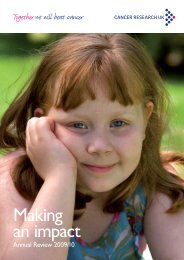Annual Report and Accounts 2010/11 - Cancer Research UK
Annual Report and Accounts 2010/11 - Cancer Research UK
Annual Report and Accounts 2010/11 - Cancer Research UK
- No tags were found...
You also want an ePaper? Increase the reach of your titles
YUMPU automatically turns print PDFs into web optimized ePapers that Google loves.
Our finances<br />
Despite a challenging economic environment,<br />
we reported a satisfactory outcome for the year<br />
with total income of £483 million (<strong>2010</strong>: £515 million)<br />
<strong>and</strong> total funds of £186 million (<strong>2010</strong>: £182 million).<br />
The outcome for the year was better than we expected,<br />
however the outlook remains challenging <strong>and</strong> uncertain <strong>and</strong><br />
we continue to take a conservative approach to the<br />
commitment of expenditure <strong>and</strong> overall management of<br />
reserves. This is reflected in our reserves <strong>and</strong> investment<br />
policies as referred to on pages 12 <strong>and</strong> 13.<br />
During the year, we maintained our annual research activity at<br />
£332 million (<strong>2010</strong>: £334 million). This is the key element of<br />
financial planning <strong>and</strong> we remain well placed to continue to<br />
meet our research commitments going forward due to a funds<br />
position of £186 million (<strong>2010</strong>: £182 million) <strong>and</strong> cash <strong>and</strong><br />
investments of £2<strong>11</strong> million (<strong>2010</strong>: £225 milllion) at year end.<br />
Income<br />
Total income was down by 6% to £483 million (<strong>2010</strong>:<br />
£515 million). However, adjusting for two one-off income<br />
windfalls in 2009/10 underlying income was down 3%,<br />
holding up well in the current climate.<br />
Income from fundraising was down by 3% to £433 million<br />
(<strong>2010</strong>: £446 million), again a good result. Two key factors<br />
influenced the income reduction. In the Race for Life series<br />
of events, participant numbers were 64,000 (9%) less than<br />
in 2009, <strong>and</strong> the average sponsorship received for offline<br />
donations was lower, reducing income by 12% to £58 million<br />
(<strong>2010</strong>: £66 million). Income in 2009/10 included our<br />
largest-ever legacy.<br />
This was partially offset by increased income from direct giving<br />
of over £5 million to £100 million, with lapse rates remaining<br />
stable <strong>and</strong> average value of donations increasing. Also, our new<br />
fundraising event, a night-time walking marathon called Shine,<br />
raised £2 million <strong>and</strong> this event is being developed in 20<strong>11</strong>.<br />
Retail income held up well, with income of £65 million from<br />
donated stock <strong>and</strong> bought-in goods almost unchanged from<br />
2009/10.<br />
Costs of generating funds<br />
The costs of generating funds increased to £151 million<br />
(<strong>2010</strong>: £143 million). This reflects the increasing challenge to<br />
raise funds in the current giving market. Unlike 2009/10, we<br />
did not benefit from any unanticipated ‘windfalls’ in <strong>2010</strong>/<strong>11</strong>.<br />
Our investment in fundraising is essential to sustaining income<br />
to fund long-term research. We remain focused on driving<br />
efficiencies <strong>and</strong> optimising costs.<br />
Despite reduced income, increased costs <strong>and</strong> technology<br />
investment, 80% of every £1 donated was available to beat<br />
cancer (<strong>2010</strong>: 83%). During the year we reviewed the basis of<br />
calculation to reflect each £1 donated as opposed to each<br />
£1 received, as this is considered to be a more appropriate<br />
measure.<br />
Costs of charitable activities<br />
Our research is carried out in many institutes, universities<br />
<strong>and</strong> hospitals across the <strong>UK</strong>, both by our employees <strong>and</strong><br />
by our grant-funded researchers – in many cases working<br />
closely together.<br />
<strong>Research</strong> costs <strong>and</strong> how we report grants<br />
Many of our programme grants are awarded for up to<br />
five years <strong>and</strong> may be renewed to support the next stage<br />
in the research process. Clinical trials can take several years<br />
to complete <strong>and</strong> may require many years of follow-up. In all<br />
areas we carry out the same rigorous process of evaluating,<br />
reviewing <strong>and</strong> ensuring the highest st<strong>and</strong>ard of research in<br />
allocating our funds. Committees of international experts in<br />
each research field review funding applications, including<br />
renewal of existing awards, <strong>and</strong> monitor the quality of<br />
research programmes.<br />
6%<br />
Cost of charitable<br />
activities up to £340 million<br />
(<strong>2010</strong>: £322 million)<br />
3%<br />
Fundraising income down<br />
to £433 million<br />
(<strong>2010</strong>: £446 million)<br />
6%<br />
Total income down<br />
to £483 million<br />
(<strong>2010</strong>: £515 million)<br />
10 / <strong>Annual</strong> <strong>Report</strong> <strong>and</strong> <strong>Accounts</strong> / Our finances



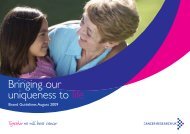
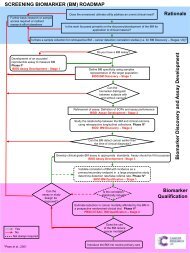
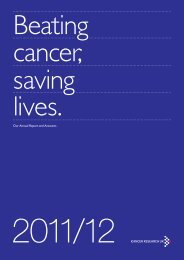
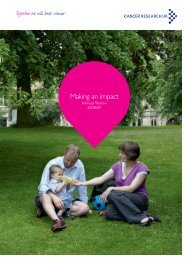
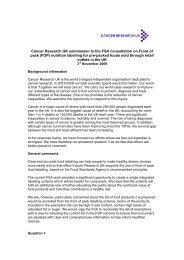
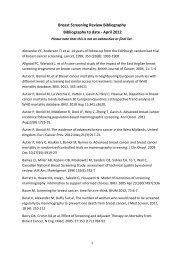
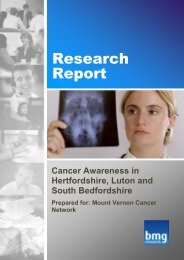
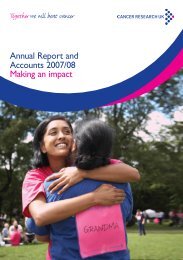
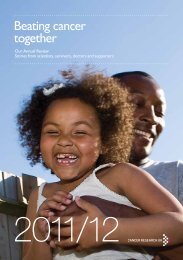

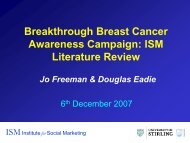
![[PDF] Cancer Research UK's strategy 2009 - 2014](https://img.yumpu.com/29239422/1/184x260/pdf-cancer-research-uks-strategy-2009-2014.jpg?quality=85)
